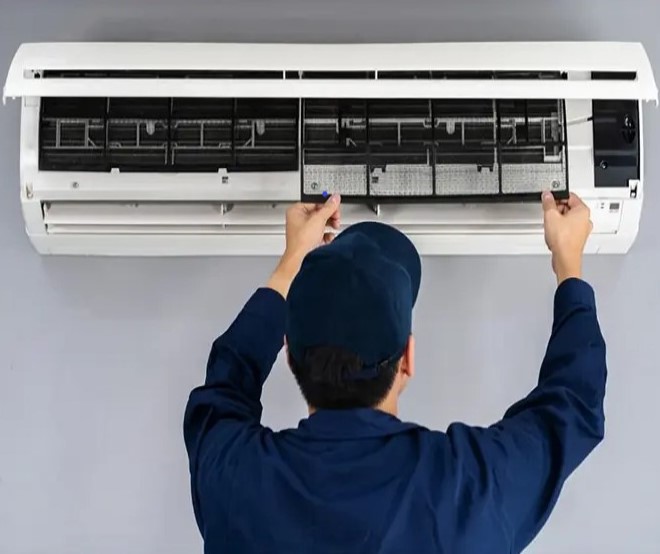Owning a home is one of the most exciting and rewarding experiences, and highlights the degree of a person’s stability in the community. The owning of a home, while extremely satisfying, requires a vested and acute devotion of attention by the home owner, especially into the air conditioning unit. There are several things that both a new and seasoned home owner can do to keep their units in excellent operating condition.
Know Your System
The competitive fair market economy of the United States has created an environment that fosters technological advancement that is unmatched in the world. The product market is always advancing, bringing new and improved products that achieve higher standards of performance regularly. The home owner needs to make a purposeful effort to identify their specific system in in order to take care of it properly.
The first step to care and maintenance of your air conditioning system is to locate or obtain the manuals for your system. There should be at least two, depending on the type of system you have. If your central air has a design that incorporates the entire system into one unit in one location, it is possible to have one book that covers all of the maintenance required. A lot of homes will have a unit outside of the home that removes the moisture from the air and a system located inside the home that will force the air throughout the home through the duct system. It is possible and rather likely that you will be provided with two manuals in this type of setup. There is no substitute for first hand source information created by the manufacturer that identifies the required regular maintenance for your system. Read the manual and look for a checklist of monthly, quarterly, and annual maintenance checks that need to be executed for the preservation of your system’s operational health. Get familiar with the components of your AC system, especially the air filter system, the external unit, and the internal central air unit. It is not necessary to have a technical troubleshooting education to do the regular maintenance.
The Basics
Once you know where the basic components of your system are, the next step is to identify the maintenance operations you can perform yourself. Recognize immediately that safety is going to have to take a high priority concern. Without professional licensing and training, you need to be careful to follow the instructions in your manual. The first step is to always turn off any electric at the power panel of the unit and make sure it is powered down. Once the unit is powered down, depending on the maintenance you are performing, you are able to proceed carefully.
The most basic task in routine maintenance is to change your air filter. A clogged air filter will drastically impact your system’s performance. There are several types of filters on the market. Some filters are disposable and must be replaced, while other ones can be cleaned and reinstalled. If you have a serviceable air filter, then you must make sure it is completely dry before you put it back in place.
Another routine maintenance check commonly included in a biannual inspection is to make sure the AC drain line is clear of debris and flow is unrestricted. When water builds up in the drain system, moisture circulates through the blower assembly and renders your AC system ineffective. Moisture in the system will also cause component damage in the form of rust and can cause more expensive repairs. While you have the power off and the filter out, it is a good time to clean any dirt or pooled water in the drain pan.
For the more confident homeowner, there are a few other steps to take for regular maintenance. Again, with the power off, inspect your coolant unit. There is an item that looks similar to a radiator in your car, called a condenser. You may have to remove a cover to get to it, but it should be inspected for debris. As water and dirt circulate in the external unit due to its own operation or inclement weather conditions, the fins of the unit may become clogged and restrict air flow. The fins are very delicate and require the utmost care when performing any level of maintenance. There is a tool called a comb that literally looks something like a comb that can be used to protect the fins while you comb out the dirt. It is a good idea to use some sort of softening agent or spray to try and loosen the dirt beforehand and perhaps eliminate the need to use a comb altogether. The risks of damage are severely mitigated when you clean your unit regularly because it prevents significant build up that will require more direct and intense cleaning methods.
One of the last remaining maintenance checks that a homeowner can execute is to visually inspect the duct work in the attic or under the floor of the home, depending on how your home was constructed. If there is a disconnected duct or breach in the airway, the conditioned air will be contaminated and reduce the effectiveness of the AC production. Some rooms may be cooler than others and there may be smells or dirt inside of those rooms coming through the vents.
Third Party Maintenance
During routine maintenance, the biggest risk to the homeowner is possible damage to the fins of the condenser. It is a good idea to delegate that responsibility to a HVAC (heating, ventilation, air conditioning) technician who is familiar with the tools and knows the delicate nature of the condenser to not damage it during maintenance. Air conditioning is complex and poses the risk of bodily harm and property damage to the uninitiated. There are several issues that require the paid services of a professional, such as those at bobheinmiller.com, to keep your unit in tip top shape.
Only licensed and certified professionals can purchase Freon in any real quantity. AC units require exact amounts of refrigerant that must be installed with the proper tools and techniques. There is usually no dipstick to check the level of the refrigerant and it must be checked with gauges for proper readings. Keeping the unit at the correct levels of refrigerant will prevent more severe issues to the pump and keep the air cooling operation efficient.
Air conditioning repair companies will normally offer an annual inspection to look over the entire system for nominal charges. Establishing a relationship with AC companies and performing proactive checks will help prevent larger issues and keep major repair costs down. The homeowner that fixes a problem only with a major repair usually discovers they have an even bigger list of things that need repairs, unlike the homeowner that performs regular maintenance. Keeping your unit in top shape does not have to be an intimidating process, it can be one more part of homeownership that makes the house into your home.
The author, Ray Donato, is a home improvement guru who is constantly working around the house in his spare time to make sure everything runs perfectly. If you're interested in learning more about Ray you can visit Google+.

 DE
DE  EN
EN 



